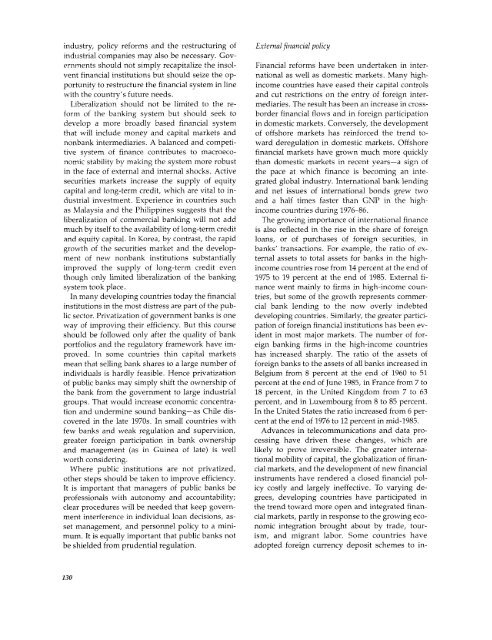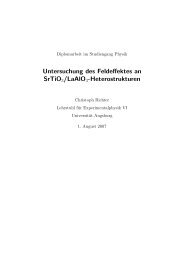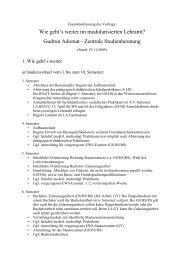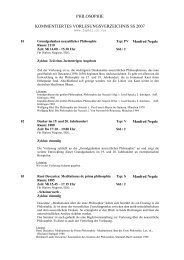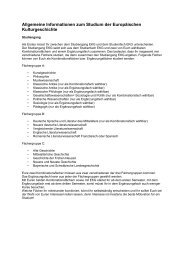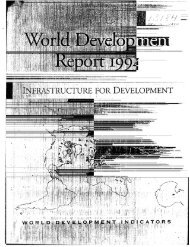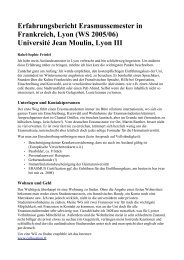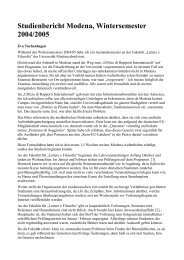Financial systems and development
Financial systems and development
Financial systems and development
You also want an ePaper? Increase the reach of your titles
YUMPU automatically turns print PDFs into web optimized ePapers that Google loves.
industry, policy reforms <strong>and</strong> the restructuring of External financial policy<br />
industrial companies may also be necessary. Governments<br />
should not simply recapitalize the insol- <strong>Financial</strong> reforms have been undertaken in intervent<br />
financial institutions but should seize the op- national as well as domestic markets. Many highportunitv<br />
to restructure the financial system in line income countries have eased their capital controls<br />
with the country's future needs.<br />
<strong>and</strong> cut restrictions on the entry of foreign inter-<br />
Liberalization should not be limited to the re- mediaries. The result has been an increase in crossform<br />
of the banking system but should seek to border financial flows <strong>and</strong> in foreign participation<br />
develop a more broadly based financial system in domestic markets. Conversely, the <strong>development</strong><br />
that will include money <strong>and</strong> capital markets <strong>and</strong> of offshore markets has reinforced the trend tononbank<br />
intermediaries. A balanced <strong>and</strong> competi- ward deregulation in domestic markets. Offshore<br />
tive system of finance contributes to macroeco- financial markets have grown much more quickly<br />
nomic stability by making the system more robust than domestic markets in recent years-a sign of<br />
in the face of external <strong>and</strong> internal shocks. Active the pace at which finance is becoming an intesecurities<br />
markets increase the supply of equity grated global industry. International bank lending<br />
capital <strong>and</strong> long-term credit, which are vital to in- <strong>and</strong> net issues of international bonds grew two<br />
dustrial investment. Experience in countries such <strong>and</strong> a half times faster than GNP in the highas<br />
Malaysia <strong>and</strong> the Philippines suggests that the income countries during 1976-86.<br />
liberalization of commercial banking will not add The growing importance of international finance<br />
much by itself to the availability of long-term credit is also reflected in the rise in the share of foreign<br />
<strong>and</strong> equity capital. In Korea, by contrast, the rapid loans, or of purchases of foreign securities, in<br />
growth of the securities market <strong>and</strong> the develop- banks' transactions. For example, the ratio of exment<br />
of new nonbank institutions substantially ternal assets to total assets for banks in the highimproved<br />
the supply of long-term credit even income countries rose from 14 percent at the end of<br />
though only limited liberalization of the banking 1975 to 19 percent at the end of 1985. External fisystem<br />
took place.<br />
nance went mainly to firms in high-income coun-<br />
In many developing countries today the financial tries, but some of the growth represents commerinstitutions<br />
in the most distress are part of the pub- cial bank lending to the now overly indebted<br />
lic sector. Privatization of government banks is one developing countries, Similarly, the greater particiway<br />
of improving their efficiency. But this course pation of foreign financial institutions has been evshould<br />
be followed only after the quality of bank ident in most major markets. The number of forportfolios<br />
<strong>and</strong> the regulatory framework have im- eign banking firms in the high-income countries<br />
proved. In some countries thin capital markets has increased sharply. The ratio of the assets of<br />
mean that selling bank shares to a large number of foreign banks to the assets of all banks increased in<br />
individuals is hardly feasible. Hence privatization Belgium from 8 percent at the end of 1960 to 51<br />
of public banks may simply shift the ownership of percent at the end of June 1985, in France from 7 to<br />
the bank from the government to large industrial 18 percent, in the United Kingdom from 7 to 63<br />
groups. That would increase economic concentra- percent, <strong>and</strong> in Luxembourg from 8 to 85 percent.<br />
tion <strong>and</strong> undermine sound banking-as Chile dis- In the United States the ratio increased from 6 percovered<br />
in the late 1970s. In small countries with cent at the end of 1976 to 12 percent in mid-1985.<br />
few banks <strong>and</strong> weak regulation <strong>and</strong> supervision, Advances in telecommunications <strong>and</strong> data progreater<br />
foreign participation in bank ownership cessing have driven these changes, which are<br />
<strong>and</strong> management (as in Guinea of late) is well likely to prove irreversible. The greater internaworth<br />
considering.<br />
tional mobility of capital, the globalization of finan-<br />
Where public institutions are not privatized, cial markets, <strong>and</strong> the <strong>development</strong> of new financial<br />
other steps should be taken to improve efficiency. instruments have rendered a closed financial pol-<br />
It is important that managers of public banks be icy costly <strong>and</strong> largely ineffective. To varying deprofessionals<br />
with autonomy <strong>and</strong> accountability; grees, developing countries have participated in<br />
clear procedures will be needed that keep govern- the trend toward more open <strong>and</strong> integrated finanment<br />
interference in individual loan decisions, as- cial markets, partly in response to the growing ecoset<br />
management, <strong>and</strong> personnel policy to a mini- nomic integration brought about by trade, tourmum.<br />
It is equally important that public banks not ism, <strong>and</strong> migrant labor. Some countries have<br />
be shielded from prudential regulation.<br />
adopted foreign currency deposit schemes to in-<br />
130


